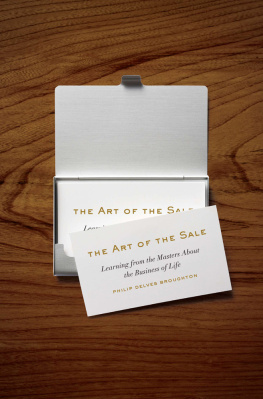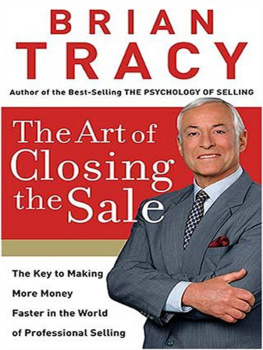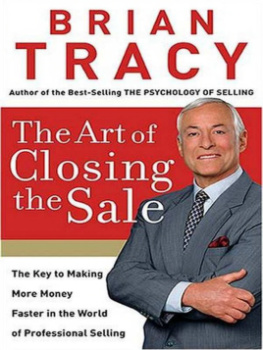Philip Delves Broughton - The Art of the Sale: Learning from the Masters about the Business of Life
Here you can read online Philip Delves Broughton - The Art of the Sale: Learning from the Masters about the Business of Life full text of the book (entire story) in english for free. Download pdf and epub, get meaning, cover and reviews about this ebook. City: New York, New York, year: 2012, publisher: The Penguin Press, genre: Detective and thriller. Description of the work, (preface) as well as reviews are available. Best literature library LitArk.com created for fans of good reading and offers a wide selection of genres:
Romance novel
Science fiction
Adventure
Detective
Science
History
Home and family
Prose
Art
Politics
Computer
Non-fiction
Religion
Business
Children
Humor
Choose a favorite category and find really read worthwhile books. Enjoy immersion in the world of imagination, feel the emotions of the characters or learn something new for yourself, make an fascinating discovery.
- Book:The Art of the Sale: Learning from the Masters about the Business of Life
- Author:
- Publisher:The Penguin Press
- Genre:
- Year:2012
- City:New York, New York
- Rating:4 / 5
- Favourites:Add to favourites
- Your mark:
- 80
- 1
- 2
- 3
- 4
- 5
The Art of the Sale: Learning from the Masters about the Business of Life: summary, description and annotation
We offer to read an annotation, description, summary or preface (depends on what the author of the book "The Art of the Sale: Learning from the Masters about the Business of Life" wrote himself). If you haven't found the necessary information about the book — write in the comments, we will try to find it.
Abstract: From the author of Ahead of the Curve The first book of its kind, The Art of the Sale
The Art of the Sale: Learning from the Masters about the Business of Life — read online for free the complete book (whole text) full work
Below is the text of the book, divided by pages. System saving the place of the last page read, allows you to conveniently read the book "The Art of the Sale: Learning from the Masters about the Business of Life" online for free, without having to search again every time where you left off. Put a bookmark, and you can go to the page where you finished reading at any time.
Font size:
Interval:
Bookmark:
of the Sale
ALSO BY PHILIP DELVES BROUGHTON
Ahead of the Curve:
Two Years at Harvard Business School
The Art
of the Sale
LEARNING FROM THE MASTERS
ABOUT THE BUSINESS OF LIFE
PHILIP DELVES BROUGHTON
THE PENGUIN PRESS
NEW YORK
2012
THE PENGUIN PRESS
Published by the Penguin Group
Penguin Group (USA) Inc., 375 Hudson Street, New York, New York 10014,
U.S.A. Penguin Group (Canada), 90 Eglinton Avenue East, Suite 700, Toronto,
Ontario, Canada M4P 2Y3 (a division of Pearson Penguin Canada Inc.) Penguin Books
Ltd, 80 Strand, London WC2R 0RL, England Penguin Ireland, 25 St. Stephens Green,
Dublin 2, Ireland (a division of Penguin Books Ltd) Penguin Books Australia Ltd, 250
Camberwell Road, Camberwell, Victoria 3124, Australia (a division of Pearson Australia
Group Pty Ltd) Penguin Books India Pvt Ltd, 11 Community Centre, Panchsheel Park,
New Delhi 110 017, India Penguin Group (NZ), 67 Apollo Drive, Rosedale,
Auckland 0632, New Zealand (a division of Pearson New Zealand Ltd) Penguin Books
(South Africa) (Pty) Ltd, 24 Sturdee Avenue, Rosebank, Johannesburg 2196, South Africa
Penguin Books Ltd, Registered Offices:
80 Strand, London WC2R 0RL, England
First published in 2012 by The Penguin Press,
a member of Penguin Group (USA) Inc.
Copyright Philip Delves Broughton, 2012
All rights reserved
LIBRARY OF CONGRESS CATALOGING IN PUBLICATION DATA
Broughton, Philip Delves.
The art of the sale : learning from the masters about the business of life /Philip Delves Broughton.
p. cm.
Includes bibliographical references and index.
ISBN 978-1-101-56174-4
1. Selling. I. Title.
HF5438.25.B7467 2012
658.85dc23
2011040209
Printed in the United States of America
1 3 5 7 9 10 8 6 4 2
DESIGNED BY AMANDA DEWEY
No part of this book may be reproduced, scanned, or distributed in any printed or
electronic form without permission. Please do not participate in or encourage piracy of
copyrighted materials in violation of the authors rights. Purchase only authorized editions.
ALWAYS LEARNING
PEARSON
For Margret, Augie, and Hugo
You can get all As and still flunk life.
WALKER PERCY
You call yourself a salesman, you sonofabitch?
DAVID MAMET, GLENGARRY GLEN ROSS
Lifes a pitchand then you buy.
BILLY MAYS, THE INFOMERCIAL KING
I imagined when I went to Harvard Business School to study for my MBA that sales would be part of the curriculum. But it wasnt. In fact, the subject is absent from most MBA programs. If you accept the idea that business is about selling things and making things, and that everything else is secondary, then this absence makes no sense. When I asked one of my Harvard professors to explain it, he told me that if I really wanted to study sales, I could pay for a two-week evening course somewhere. You could say the same thing about a lot of what the school taught, but no one was suggesting we go and learn strategy at night school.
In his book Birth of a Salesman, the Harvard Business School professor Walter Friedman observed that while business schools have continued to offer some type of sales management instructionusually within a larger marketing coursethey do not offer courses in salesmanship skills. The topic remains, just as it was in the 1910s, more suitable for popular how-to books and memoirs of successful salespeople than for academic classes. Economists, for their part, still tend to ignore the role of salesmanship in the economy. Part of the problem is institutional. In order to get tenure at a business school, you need to be published in a handful of journals, which focus on finance, marketing, strategy, and operations, leaving little room or serious consideration for articles on selling. So for reasons that have nothing to do with the relevance of selling in business, selling is an orphan in business academe.
The effects of this omission are grave. Many supposedly well-educated people in the business world are clueless about one of its most vital functions, the means by which you actually generate revenue. The absence of knowledge about sales has opened a class division between salespeople and the rest of business. Salespeople are often seen as operating by different rules and needing different motivators from other employees. They need conventions in Las Vegas and complex commission structures. They need to be goaded to perform and reined in when they sell too hard. They are patronized as feet on the street by those who prefer to imagine that business can be conducted by consultants with dueling PowerPoint presentations. Salesmen themselves use terms that diminish the complexity of what they do. IBM salespeople used to talk of pushing metal (mainframe computers), and Xerox salespeople of slamming boxes (photocopiers).
When Bank of America rescued Merrill Lynch from imminent bankruptcy at the depth of the financial crisis in late 2008, Merrill Lynchs brokers derided Bank of Americas retail bankers as toaster salesmen. Bank of Americas chief executive, Kenneth Lewis, was similarly described as a former shoe salesman, in contrast to Merrill Lynchs Harvard- and Goldman Sachstrained boss, John Thain. Lewis had indeed sold shoes while he was in high school; he had been paid a commission of 36 cents per pair. Hed also sold Christmas cards door-to-door and while in college worked at a municipal bond firm and as a reservations agent for United Airlines. Good for Lewis, one might think, to have risen up the hard way. So why reduce him to a former shoe salesman? Anyone who has actually started, bought, or run a business knows how absurd such pejorative perceptions of salespeople are. Selling is not a sideshow, a pesky obligation apart from the real business of finance, law, or accounting. It is business in gorgeous Technicolor.
Richard Perry, the founder of Perry Capital and one of the most successful investors in America, put it very simply to me: Its all about sales. If I have sales, I can create profit. Perrys offices are in the General Motors building on Fifth Avenue in the heart of Manhattan, a building that weaves together many strands of contemporary American business. It was completed in 1968 as an expression of the might of the U.S. car industry, sheathed in glass and white Georgia marble, and occupies an entire city block. These days, its main tenants are hedge funds, law firms, and, beneath its street-level plaza, an Apple store. In 2008, the New York developer who owned the building had to sell it because of the credit crunch to a group of investors led by Goldman Sachs and assorted Middle Eastern sovereign wealth funds. The buildings evolution, from the symbol of homegrown manufacturing power to a home for hedge funds and iPhones runs parallel to that of the broader American economy.
Perry began his career at Goldman Sachs before striking out to found his own firm in 1988. Perry Capital has proved to be one of the most enduring and successful of the many hedge funds founded in New York over the past two decades, moving from investment strategy to investment strategy, from buying equities to issuing credit, fighting shareholder battles to betting big on mergers and acquisitions, making fortunes at every turn for its investors, employees, and Perry himself. During that time, he has met salespeople of every stripe, in financial services and beyond. As he sat back in one of his firms many hypermodern conference rooms, he told me, If you arent selling, you arent part of the world.
Perry possesses the supreme self-confidence required to surf the treacherous financial markets as adroitly as he does. Its a style shared among any number of successful financiers. Bruce Wasserstein, the late chief executive of the investment bank Lazard, was famously gruff and unkempt. But if you were thinking of buying or selling a company, and you could afford him, he would be the first man on your team. You were happy to ignore his brusqueness because no one knew the M&A (mergers and acquisitions) game as well as he did. His success sold his services. The great salesmen have the facts. Theyre the anti-sell, says Perry. They dont have to do anything. You just want to buy from them. Its like choosing between surgeons. Do you want the one with the tidy office and the ironed shirt? Or the rude slob who has performed 100 successful operations in a row? In some ways, this is the ideal. You have a product so irresistible that selling it is simply a question of placing it in front of the slavering prospect. No need for the artfully prepared bid, the tickets to the game, the winning smile. The salesman floats his pitch and the hungry buyer slams it over the bleachers for a home run. Everyone makes money and we all go home. But even in investing, where performance can be measured in the unforgiving digits of a risk-adjusted return, the selling goes on. Perry himself is a tall, athletic man, physically imposing and fashionably dressed. His offices are starkly white and dripping with modern art that emphasizes the firms wealth from the moment you enter. There is no false modesty here. Even after so many years, and such an extensive track record, Perry Capital remains dressed for success.
Font size:
Interval:
Bookmark:
Similar books «The Art of the Sale: Learning from the Masters about the Business of Life»
Look at similar books to The Art of the Sale: Learning from the Masters about the Business of Life. We have selected literature similar in name and meaning in the hope of providing readers with more options to find new, interesting, not yet read works.
Discussion, reviews of the book The Art of the Sale: Learning from the Masters about the Business of Life and just readers' own opinions. Leave your comments, write what you think about the work, its meaning or the main characters. Specify what exactly you liked and what you didn't like, and why you think so.













